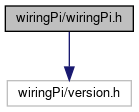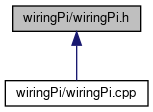#include <wiringPi/version.h>

Go to the source code of this file.
Macros | |
| #define | TRUE (1==1) |
| Logical TRUE. More... | |
| #define | FALSE (!TRUE) |
| Logical FALSE. More... | |
| #define | INPUT 0 |
| Pin type: input. More... | |
| #define | OUTPUT 1 |
| Pin type: output. More... | |
| #define | PWM_OUTPUT 2 |
| Pin type: PWM output. More... | |
| #define | GPIO_CLOCK 3 |
| Pin type: GPIO clock. More... | |
| #define | SOFT_PWM_OUTPUT 4 |
| Pin type: soft PWM output. More... | |
| #define | SOFT_TONE_OUTPUT 5 |
| Pin type: soft tone ouput. More... | |
| #define | PWM_TONE_OUTPUT 6 |
| Pin type: PWM tone output. More... | |
| #define | LOW 0 |
| Digital LOW. More... | |
| #define | HIGH 1 |
| Digital HIGH. More... | |
| #define | PUD_OFF 0 |
| Pull Up/Down resistor: off. More... | |
| #define | PUD_DOWN 1 |
| Pull Up/Down resistor: down. More... | |
| #define | PUD_UP 2 |
| Pull Up/Down resistor: up. More... | |
| #define | PWM_MODE_MS 0 |
| PWM milliseconds mode. More... | |
| #define | PWM_MODE_BAL 1 |
| PWM balanced mode. More... | |
| #define | INT_EDGE_SETUP 0 |
| #define | INT_EDGE_FALLING 1 |
| Interrupt triggered on the falling edge. More... | |
| #define | INT_EDGE_RISING 2 |
| Interrupt triggered on the rising edge. More... | |
| #define | INT_EDGE_BOTH 3 |
| Interrupt triggered on BOTH edges. More... | |
Functions | |
| int | wiringPiSetup (void) |
| Must be called once at the start of your program execution. More... | |
| int | wiringPiSetupGpio (void) |
| Must be called once at the start of your program execution. More... | |
| int | wiringPiSetupPhys (void) |
| Must be called once at the start of your program execution. More... | |
| int | wiringPiSetupSys (void) |
| Must be called once at the start of your program execution. More... | |
| int | wiringPiISR (int pin, int edgeType, void(*function)(void)) |
| Register a Interrupt Service Routine (ISR) - Pi Specific. More... | |
| void | pinMode (int pin, int mode) |
| Sets the mode of a pin to be input, output or PWM output. More... | |
| void | pullUpDnControl (int pin, int pud) |
| Control the internal pull-up/down resistors on a GPIO pin. More... | |
| void | digitalWrite (int pin, int value) |
| Set an output bit. More... | |
| void | pwmWrite (int pin, int value) |
| Set an output PWM value. More... | |
| int | digitalRead (int pin) |
| Read the value of a given Pin. More... | |
| int | analogRead (int pin) |
| Read the analogue value of a given Pin. More... | |
| void | analogWrite (int pin, int value) |
| Write the analog value to the given Pin. More... | |
| int | waitForInterrupt (int pin, int timeOut, int mode) |
| When called, it will wait for an interrupt event to happen on that pin and your program will be stalled.. More... | |
| unsigned int | millis (void) |
| Get time in milliseconds. More... | |
| unsigned int | micros (void) |
| Get time in microseconds. More... | |
| void | delay (unsigned int howLong) |
| Wait for an amount of milliseconds. More... | |
| void | delayMicroseconds (unsigned int howLong) |
| Wait for an amount of microseconds. More... | |
| void | wiringPiVersion (int *major, int *minor) |
| Get the current major and minor version number. More... | |
Macro Definition Documentation
◆ FALSE
| #define FALSE (!TRUE) |
Logical FALSE.
◆ GPIO_CLOCK
| #define GPIO_CLOCK 3 |
Pin type: GPIO clock.
◆ HIGH
| #define HIGH 1 |
Digital HIGH.
◆ INPUT
| #define INPUT 0 |
Pin type: input.
◆ INT_EDGE_BOTH
| #define INT_EDGE_BOTH 3 |
Interrupt triggered on BOTH edges.
◆ INT_EDGE_FALLING
| #define INT_EDGE_FALLING 1 |
Interrupt triggered on the falling edge.
◆ INT_EDGE_RISING
| #define INT_EDGE_RISING 2 |
Interrupt triggered on the rising edge.
◆ INT_EDGE_SETUP
| #define INT_EDGE_SETUP 0 |
If INT_EDGE_SETUP is used for wiringPiISR, it is assumed that the pin is assumed that you have already setup the pin elsewhere (e.g. with the gpio program)
◆ LOW
| #define LOW 0 |
Digital LOW.
◆ OUTPUT
| #define OUTPUT 1 |
Pin type: output.
◆ PUD_DOWN
| #define PUD_DOWN 1 |
Pull Up/Down resistor: down.
◆ PUD_OFF
| #define PUD_OFF 0 |
Pull Up/Down resistor: off.
◆ PUD_UP
| #define PUD_UP 2 |
Pull Up/Down resistor: up.
◆ PWM_MODE_BAL
| #define PWM_MODE_BAL 1 |
PWM balanced mode.
◆ PWM_MODE_MS
| #define PWM_MODE_MS 0 |
PWM milliseconds mode.
◆ PWM_OUTPUT
| #define PWM_OUTPUT 2 |
Pin type: PWM output.
◆ PWM_TONE_OUTPUT
| #define PWM_TONE_OUTPUT 6 |
Pin type: PWM tone output.
◆ SOFT_PWM_OUTPUT
| #define SOFT_PWM_OUTPUT 4 |
Pin type: soft PWM output.
◆ SOFT_TONE_OUTPUT
| #define SOFT_TONE_OUTPUT 5 |
Pin type: soft tone ouput.
◆ TRUE
| #define TRUE (1==1) |
Logical TRUE.
Function Documentation
◆ analogRead()
| int analogRead | ( | int | pin | ) |
◆ analogWrite()
| void analogWrite | ( | int | pin, |
| int | value | ||
| ) |
Write the analog value to the given Pin.
There is no on-board Pi analog hardware, so this needs to go to a new node.
- Parameters
-
pin Pin number value Value
◆ delay()
| void delay | ( | unsigned int | howLong | ) |
Wait for an amount of milliseconds.
- Parameters
-
howLong Milliseconds to wait

◆ delayMicroseconds()
| void delayMicroseconds | ( | unsigned int | howLong | ) |
Wait for an amount of microseconds.
- Parameters
-
howLong Microseconds to wait
◆ digitalRead()
| int digitalRead | ( | int | pin | ) |
◆ digitalWrite()
| void digitalWrite | ( | int | pin, |
| int | value | ||
| ) |
Set an output bit.
- Parameters
-
pin Pin number value PWM value
◆ micros()
| unsigned int micros | ( | void | ) |
Get time in microseconds.
Wraps after 71 minutes.
- Returns
- Microseconds

◆ millis()
| unsigned int millis | ( | void | ) |
Get time in milliseconds.
Wraps after 49 days.
- Returns
- Milliseconds

◆ pinMode()
| void pinMode | ( | int | pin, |
| int | mode | ||
| ) |
Sets the mode of a pin to be input, output or PWM output.
- Parameters
-
pin Pin number mode Pin type (INPUT, OUTPUT, PWM_OUTPUT, etc.)
◆ pullUpDnControl()
| void pullUpDnControl | ( | int | pin, |
| int | pud | ||
| ) |
◆ pwmWrite()
| void pwmWrite | ( | int | pin, |
| int | value | ||
| ) |
◆ waitForInterrupt()
| int waitForInterrupt | ( | int | pin, |
| int | timeOut, | ||
| int | mode | ||
| ) |
When called, it will wait for an interrupt event to happen on that pin and your program will be stalled..
The timeOut parameter is given in milliseconds, or can be -1 which means to wait forever.
- Parameters
-
pin Pin number timeout Timeout (milliseconds) mode INT_EDGE_SETUP, INT_EDGE_FALLING, INT_EDGE_RISING, INT_EDGE_BOTH
- Returns
- The return value is -1 if an error occurred (and errno will be set appropriately), 0 if it timed out, or 1 on a successful interrupt event.

◆ wiringPiISR()
| int wiringPiISR | ( | int | pin, |
| int | edgeType, | ||
| void(*)(void) | function | ||
| ) |
Register a Interrupt Service Routine (ISR) - Pi Specific.
- Parameters
-
pin Pin number edgeType INT_EDGE_SETUP, INT_EDGE_FALLING, INT_EDGE_RISING, INT_EDGE_BOTH
function The ISR callback function
- Returns
- int Exit code.
◆ wiringPiSetup()
| int wiringPiSetup | ( | void | ) |
Must be called once at the start of your program execution.
Default setup: Initialises the system into wiringPi Pin mode and uses the memory mapped hardware directly.
- Todo:
- Actually enforce this.
- Returns
- int Exit code.
◆ wiringPiSetupGpio()
| int wiringPiSetupGpio | ( | void | ) |
Must be called once at the start of your program execution.
GPIO setup: Initialises the system into GPIO Pin mode and uses the memory mapped hardware directly.
- Todo:
- Actually enforce this.
- Returns
- int Exit code.
◆ wiringPiSetupPhys()
| int wiringPiSetupPhys | ( | void | ) |
Must be called once at the start of your program execution.
Phys setup: Initialises the system into Physical Pin mode and uses the memory mapped hardware directly.
- Todo:
- Actually enforce this.
- Returns
- int Exit code.
◆ wiringPiSetupSys()
| int wiringPiSetupSys | ( | void | ) |
Must be called once at the start of your program execution.
Initialisation (again), however this time we are using the /sys/class/gpio interface to the GPIO systems - slightly slower, but always usable as a non-root user, assuming the devices are already exported and setup correctly.
- Todo:
- Actually enforce this.
- Returns
- int Exit code.
◆ wiringPiVersion()
| void wiringPiVersion | ( | int * | major, |
| int * | minor | ||
| ) |
Get the current major and minor version number.
- Parameters
-
[out] major Major version number [out] minor Minor version number